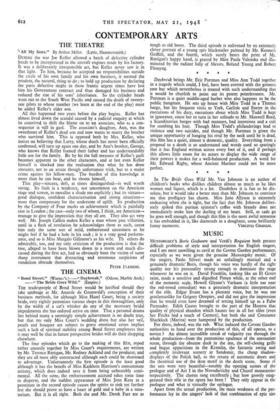CONTEMPORARY ARTS
THE THEATRE
All My Sons." By Arthur Miller. (Lyric, Hammersmith.) DURING the war Joe Keller allowed a batch of defective cylinder heads to be incorporated in the aircraft engines made by his factory. It was a deliberately irresponsible act, but Keller never saw it in that light. To him, because he accepted no responsibilities outside the circle of his own family and his own business, it seemed the prudent, the natural, thing to do; hold up production by declaring the parts defective might in ose frantic urgent times have lost him his Government contract and thus damaged his business and reduced the size of his sons' inheritance. So the cylinder heads went out to the South West Pacific and caused the death of twenty- one pilots to whose number (we learn at the end of the play) must be added Keller's elder son.
All this happened two years before the play begins. Keller has almost lived down the scandal caused by a judicial enquiry at which he contrived to shift the blame on to an associate, who as a con- sequence is still in gaol. The associate's daughter, Ann, was the sweetheart of Keller's dead son and now wants to marry the brother who survived him. This is opposed both by Mrs. Keller, who insists on believing that Larry, whose death has never been officially confirmed, will turn up again one day, and by Ann's brother, George, who knows that Keller framed their father and has understandably little use for the family. Bit by bit the full measure of Keller's guilt becomes apparent to the other characters, and at last even Keller himself is shocked into the realisation that what he has done amounts, not to an astute though unfortunate trick, but to a• major crime against his fellow-men. The 'burden of this knowledge is more than he can bear, and he shoots himself.
This play—sincere, deft, at times distinguished—is well worth seeing. Its fault is a tendency, not uncommon on the American stage and screen, to moralise a shade too explicitly ; but its virtues— good dialogue, confident characterisation and strong situations— more than compensate for the undertone of uplift. Its production by the Company of Four marks an achievement which is painfully rare in London ; the cast—only two of whom, I think, are American— manage to give the impression that they all are. They also act very well. Mr. Joseph Calleia makes Keller a man whose past villainies, until in a flash of revelation he acknowledges them as such, cause him only the same sort of mild, embarrassed uneasiness as he might feel if he had a hole in his sock ; it is a very good perform- ance, and so is Miss Margalo Gillmore's as his wife. Th others do admirably, too, and my only criticism of the production is that the tree, alleged to have been blown down in a storm and much dis- cussed during the first act, had so obviously been the victim of some sharp instrument that distracting and erroneous suspicions of vandalism obtrude themselves.
PETER FLEMING.


































 Previous page
Previous page